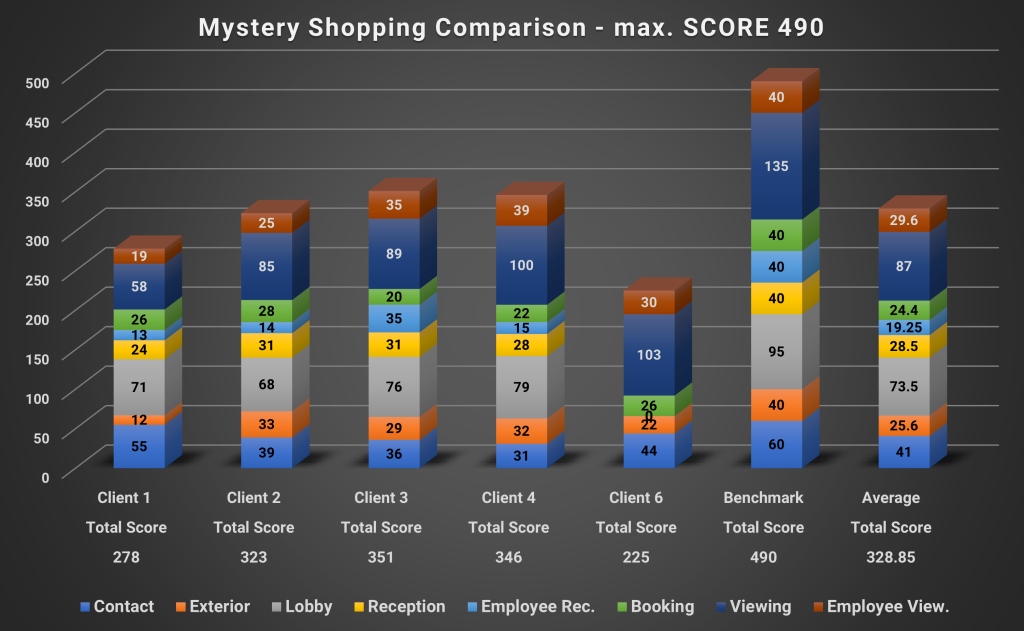A regular audit process provides a measurable and actionable data platform to improve services where and when needed. A mystery shopping audit helps owner/operators and developers identify any reasons for failures in leasing or rent conversions and potential reasons for missing operational targets.
The audits quickly highlight how site teams interact with customers and potential tenants and execute the company standards. Meanwhile, the customer experience remains front and centre and supports the organisational budget goals.
A mystery shop enables the business to better understand where to spend the marketing money, where business improvements make sense and if the current process justifies the acquisition costs for a prospective tenant by the result – aka the onboarding of a new lease.
How does the audit work?
Mystery shopping tests a business’s conversion of brand message, marketing activities and implementation of standards. The testing activity evaluates the relationship between product, website and staff, and how the quality of each impacts the customer experience and may influence revenue.
Mystery shopping is centred on the customer
The audit typically reviews and assesses a range of customer-journey touchpoints: contact, exterior, the appearance of the lobby and reception areas, booking process and communication, the viewing, and of course, any employee interaction. The tester arranges for the viewing of a unit and scores the experience against a defined checklist, reflecting a combination of common service standards and brand-specific ones.
The audit process is very straightforward and usually follows a similar pattern; testers will either manually complete an audit check-sheet or use an audio recording, or both for maximum impact.
There are several steps for a shopping audit:
| Step 1: Customer research on the website | Evaluation of how easy the brand offers can be accessed and contact established |
| Step 2: First contact/interaction with brand and representatives | Review of communications, speed, and quality of response, also the accuracy of any information published on website/collateral, etc. is verified |
| Step 3: Evaluation of virtual show-around (if applicable) | How is a brand presented, how does a company create community experience and attraction to project |
| Step 4: Unit viewing | Do steps 1-3 support the overall viewing experience? How is the asset perceived and staff experienced? |
| Step 5: Closing / after viewing communications | Are timelines and expectations met? Is the transmitted information correct? |

This comparison chart demonstrates the variety of customer experiences revealed through mystery shopping
Call to action – The London snapshot
A comparison of similarly sized and positioned build to rent assets in London have resulted in a remarkable bandwidth of scores. While different brands operate the buildings, the audits highlight similar improvement opportunities, such as:
- Shortcomings in communication and lack of timely responses
- The organisation should review processes to accentuate the brand benefits
- Shortage of hospitality experience and service touchpoints during viewing requiring additional training
- The comparison emphasised the differences in each brand’s approach to lettings and the impact on the prospective customer.
The employee scores are the most interesting as they reveal a lot about the future customer experience and community cohesion. Can you afford not to get top scores when dealing with potential customers to maximise your leasing uptake?
What are the benefits of regular audits?
Mystery Shopping allows you to get the big picture and the individual specifics from each region, building, or even individual employee. Once you have got those reports, you can act on them to increase efficiency, initiate training, influence design etc. Here are some of the most important benefits:
Increase your efficiency: You can change what is monitored and measured – the audit provides the big picture and individual specifics on a local or personal level. Once the drivers are understood, action plans and targeted training can follow.
Raises team awareness: prepare your team for specific or tricky questions to help their sales efforts. Highlight areas of improvement – this allows them to focus better on the customer’s desire for service and hospitality.
View your property through your customer’s eyes: Is the asset clean? How is the welcome and lobby? Are the hallways and amenity areas spotless? Is everything in the show unit working, welcoming, and communicating your brand? Mystery shops answer all those questions enabling you to connect emotionally with your customer before signing the rental papers!
Improve customer retention: Every improvement you make in the business because of the actionable insights gained from a mystery shopping program leads to better customer service and helps to de-risk future revenue. The focus on improving the overall customer service delivery will lead to customers being more engaged and happier and choosing your company over the competition every single time!